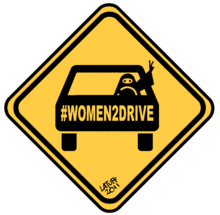 |
| Saudi women walking by two men on a motorcycle pri.org; lifehacklane.com |
New week, new topics to talk about. Today we are going to return to the subject of women and transportation. The focus is Saudi Arabia. Saudi Arabia is the sole country in the world that does not issue driver's licenses to women. The irony here is Saudi women are allowed to own cars and do drive in the rural areas. However, in cities such as Jeddah and Riyadh, women are required to have a male relative or foreign-born worker drive them where they need, in their own cars. Mimi Kirk's CityLab article, "What Riyadh's New Metro Will for Women," reports on the impact the Kingdom's new metro will have on female mobility. Will the prospect of increased mobility mean greater educational and employment opportunities? Shall we find out?
 |
| "#women2drive" en.wikipedia.org |
[Uber] shows the ugly practice of using women's suffering to make money.
How did the Saudi women respond?
A year ago, the Kingdom invest "$3.5 billion in Uber...Saudi women were incensed," to say the least. The women were furious over feeling ...cash cows for transport companies protested on social media. They posted pictures on social media, deleting ride sharing apps from their phones, and tweeting boycott announcement.
 |
| Women's metro cabin in Dubai arabianbusiness.com |
"...the biggest urban mass-transit system that's ever been created from scratch." (http//www.businessinsider.com; date accessed Feb. 27, 2017). Underground and bus lines are also planned for such cities as: Jeddah, Mecca, and Medina.
 |
| Saudi women shopping huffingtonpost.co.uk |
It will be a major solution for women.
Naturally. This will mean that women will longer have to be held hostage to a ride sharing app, rely on a male relative or foreign-born worker to drive them around. This can open up the potential of greater opportunities for women in the public sphere.
 |
| Riyadh street view Riyadh, Saudi Arabia nanozine.com |
However, it is women that will reap the primary benefit. Ms. Kirk writes, "The trains will have cars for exclusive use by single women and families, helping to maintain the segregation of the sexes and providing a reliable, socially acceptable way to travel. (A promotion video created by the High Commission for the Development of Riyadh...shows women matter-of-factly taking envisioned trains and buses.)" You can see this video at http://www.saudi.gov.sa. Hiring drivers or summing an Uber driver can be cost prohibitive, the a mass transportation system provides a more feasible option for women of lesser means.
 |
| Saudi women theweek.co.uk |
Until a new policy is put in place, we will put on the pressure as much as possible.
In the interim, Ms. al-Fassi believes that mass transportation will be a welcome service. She continued,
The new metro and bus systems will show how much and how long women have lived in unjust conditions...They will make women's lives more humane, dignified, and affordable.
In the West, we take our driver's licenses for granted. Getting a license is a right of passage, something to be celebrated. We tend to forget that there are parts of the world where women are not permitted to drive. They are forced to dependent on a male relative or foreign-born worker to chauffeur them around town. The introduction of a mass transportation system in Saudi Arabia opens the potential of making women, regardless of socio-economic status, more upwardly mobile. We have to remember that change in a very conservative country, like Saudi Arabia, happens incrementally. Mass transportation is part of the incremental change. Once it opens, it will being fascinating to watch what happens.
No comments:
Post a Comment